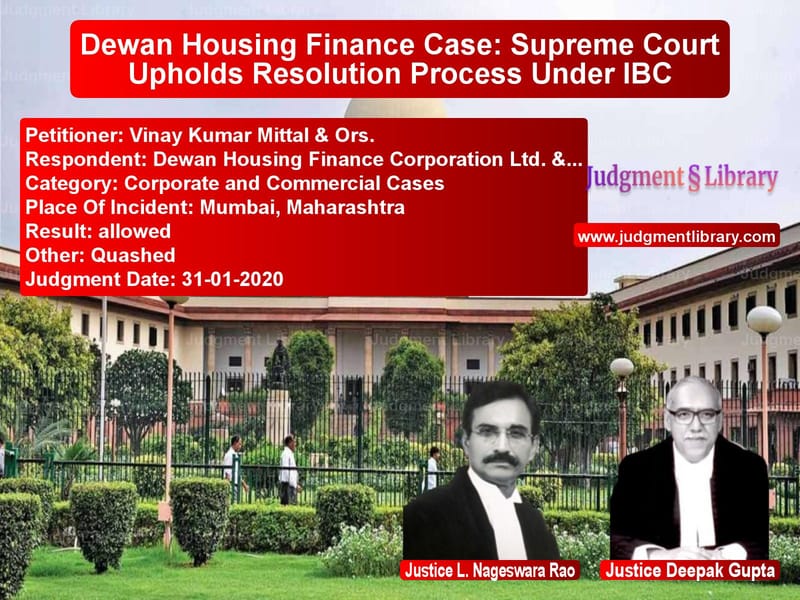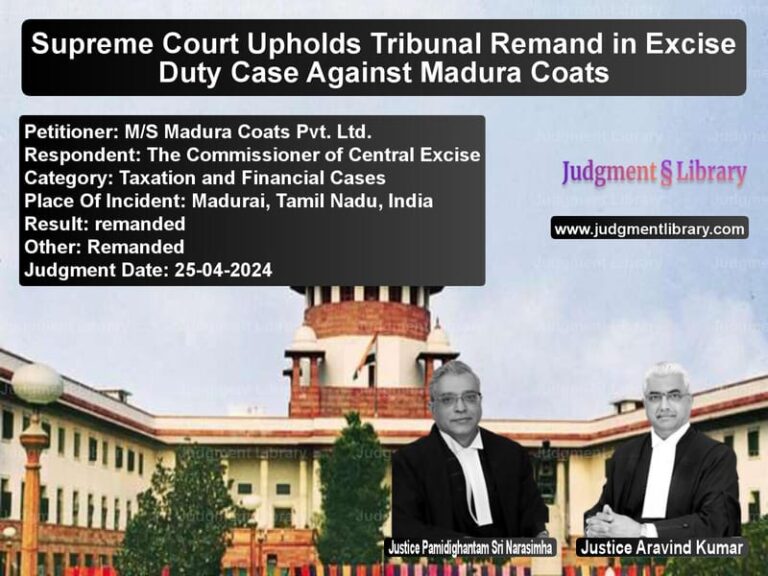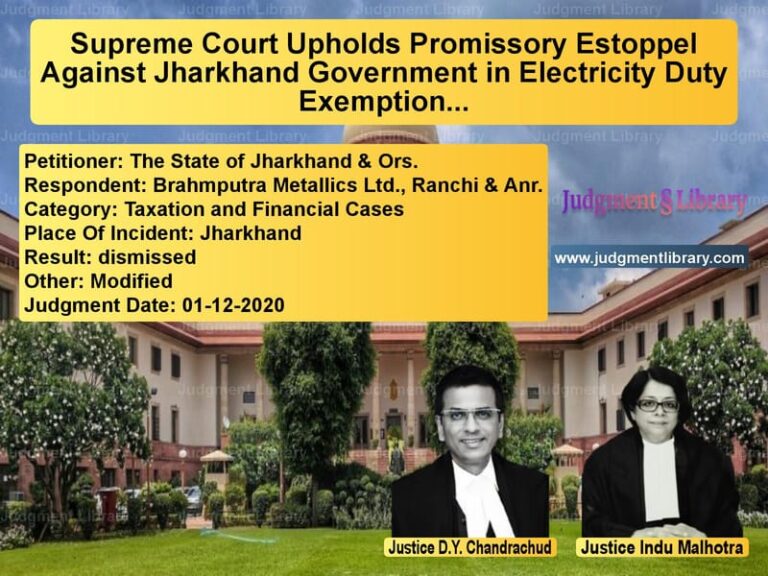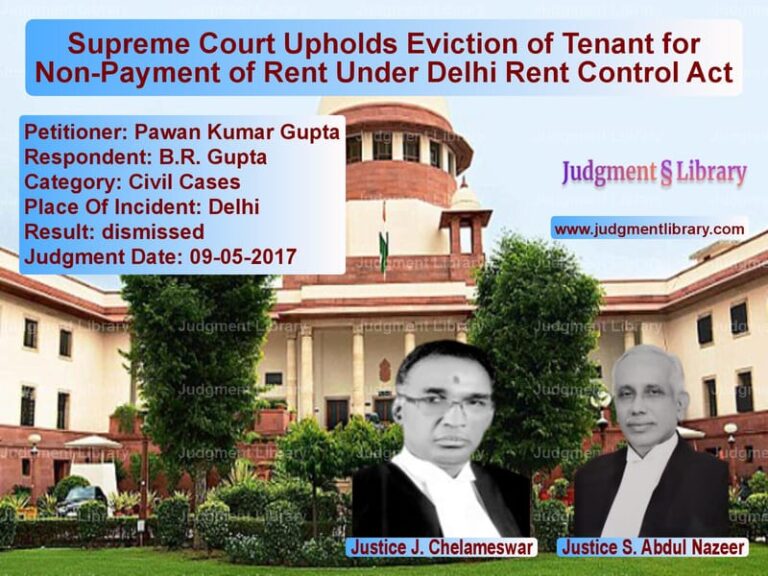Dewan Housing Finance Case: Supreme Court Upholds Resolution Process Under IBC
The case of Vinay Kumar Mittal & Ors. vs. Dewan Housing Finance Corporation Ltd. & Ors. revolves around a financial dispute where the Supreme Court examined whether depositors should be given priority over debenture holders in the insolvency resolution process of Dewan Housing Finance Corporation Ltd. (DHFL). The key legal question before the Court was whether the Bombay High Court’s interim orders restricting payments to depositors were in conflict with the Insolvency and Bankruptcy Code (IBC), 2016.
Background of the Case
Dewan Housing Finance Corporation Ltd. (DHFL), a financial service provider, faced financial distress due to a liquidity crisis. The Reserve Bank of India (RBI) initiated insolvency proceedings against DHFL, leading to intervention by the National Company Law Tribunal (NCLT).
Key developments in the case:
- Reliance Nippon Life Asset Management Ltd. (Respondent No. 4) filed a commercial suit to recover Rs. 479.31 crores from DHFL.
- The Bombay High Court, on September 30, 2019, issued an order restraining DHFL from making further payments to unsecured and secured creditors except on a pro-rata basis.
- On October 10, 2019, the High Court extended the restraining order.
- In November 2019, the RBI appointed an Administrator for DHFL under Section 45 of the RBI Act, 1934.
- The RBI filed an application before the NCLT under the IBC, initiating a Corporate Insolvency Resolution Process (CIRP) against DHFL.
Arguments by the Petitioners (Depositors)
The petitioners, who had invested in fixed deposits with DHFL, challenged the High Court’s interim orders, arguing:
- Fixed deposit holders should be given preference over debenture holders in the resolution process.
- The Bombay High Court’s restraining orders were in violation of Section 36 and 36(A) of the National Housing Bank Act, 1987, and Section 45(q)(a) of the RBI Act, 1934.
- Deposit holders were individual investors whose financial security was at risk.
- The order passed by the High Court interfered with the ongoing resolution process under IBC.
Arguments by the Respondents (DHFL and RBI)
The respondents, including the RBI-appointed Administrator and DHFL, contended:
- The insolvency resolution process under IBC was the only legally viable way to distribute the company’s assets.
- The High Court’s order could not override the moratorium imposed under Section 14 of the IBC.
- The distribution of assets should be in accordance with IBC regulations and overseen by the Committee of Creditors (CoC).
Supreme Court’s Observations
1. Overriding Effect of IBC
The Court held that the IBC is a special legislation that overrides conflicting laws, including the National Housing Bank Act and the RBI Act, in matters related to insolvency resolution.
“Once insolvency proceedings are initiated, all claims must be resolved within the framework of the IBC, and no parallel orders by the High Court can interfere with the process.”
2. Moratorium Under Section 14 of IBC
The Court emphasized that under Section 14 of the IBC, no parallel proceedings can continue against a corporate debtor once CIRP has commenced.
“The moratorium ensures that no fresh suits or claims can be entertained outside the IBC framework.”
3. Role of the Committee of Creditors (CoC)
The Court ruled that:
- The CoC is responsible for deciding the distribution of assets.
- Depositors are classified as financial creditors and must follow the claims process within the insolvency framework.
- The interests of all creditors, including depositors, must be balanced under the resolution plan.
4. Setting Aside High Court Orders
The Supreme Court found that the Bombay High Court had overstepped its jurisdiction by issuing interim orders conflicting with IBC provisions.
“Once the NCLT has initiated insolvency proceedings, any parallel orders interfering with asset distribution are impermissible.”
Final Judgment
The Supreme Court ruled:
- The Bombay High Court’s orders of September 30, 2019, October 10, 2019, and November 13, 2019 were set aside.
- The moratorium under IBC would continue until the resolution process was completed.
- All claims by depositors must be addressed by the CoC and Administrator within the framework of IBC.
Implications of the Judgment
This ruling has significant legal implications:
- IBC takes precedence over conflicting laws when insolvency proceedings are underway.
- Courts cannot issue parallel orders interfering with the CIRP.
- Depositors must follow the IBC framework to recover their investments.
- The moratorium under Section 14 of the IBC prevents any external claims against the corporate debtor.
Conclusion
The Supreme Court’s judgment ensures that insolvency resolutions proceed without judicial interference from parallel proceedings. This ruling reinforces the supremacy of IBC in resolving financial distress and provides a structured approach to handling creditors’ claims in cases involving large corporate debtors.
Petitioner Name: Vinay Kumar Mittal & Ors..Respondent Name: Dewan Housing Finance Corporation Ltd. & Ors..Judgment By: Justice L. Nageswara Rao, Justice Deepak Gupta.Place Of Incident: Mumbai, Maharashtra.Judgment Date: 31-01-2020.
Don’t miss out on the full details! Download the complete judgment in PDF format below and gain valuable insights instantly!
Download Judgment: Vinay Kumar Mittal & vs Dewan Housing Financ Supreme Court of India Judgment Dated 31-01-2020.pdf
Direct Downlaod Judgment: Direct downlaod this Judgment
See all petitions in Bankruptcy and Insolvency
See all petitions in Corporate Compliance
See all petitions in unfair trade practices
See all petitions in Judgment by L. Nageswara Rao
See all petitions in Judgment by Deepak Gupta
See all petitions in allowed
See all petitions in Quashed
See all petitions in supreme court of India judgments January 2020
See all petitions in 2020 judgments
See all posts in Corporate and Commercial Cases Category
See all allowed petitions in Corporate and Commercial Cases Category
See all Dismissed petitions in Corporate and Commercial Cases Category
See all partially allowed petitions in Corporate and Commercial Cases Category







